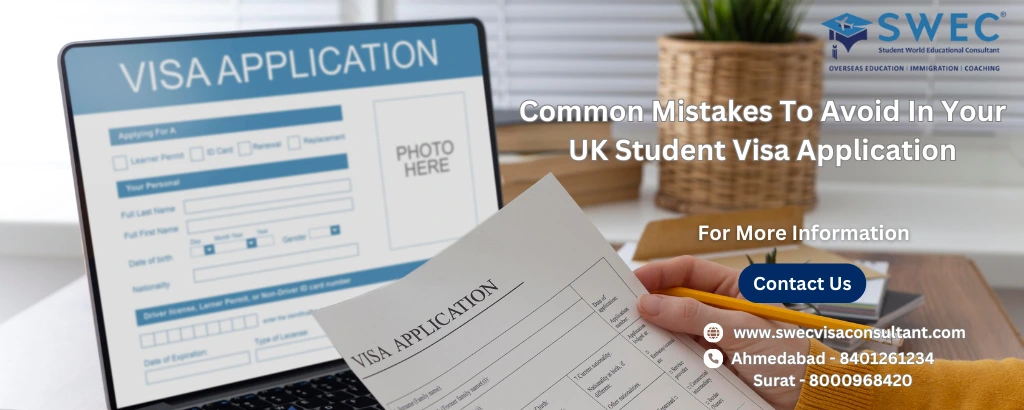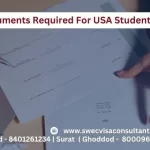The UK remains one of the top choices for international students, offering world-class education, a multicultural environment, and countless career opportunities. However, to study in the UK, international students must first secure a UK student visa—a crucial part of starting their academic journey there. The UK student visa application process, governed by UK Visas and Immigration (UKVI), has specific requirements, and any mistakes in your application can lead to delays or even visa refusals.
This guide will focus on common mistakes students make while applying for a UK student visa. By avoiding these errors, you can greatly increase your chances of receiving visa approval smoothly and on time.
Table of Contents
Understanding the UK Student Visa Requirements
Before diving into the common mistakes, it’s important to understand the basic requirements for a UK student visa. Knowing these requirements helps you gather the correct documents and submit them accurately.
- Key Requirements for a UK Student Visa:
- Confirmation of Acceptance for Studies (CAS): Your UK institution will provide a CAS letter once accepted into a course. This unique reference number confirms that you have an unconditional offer from a licensed sponsor (your university or college).
- Financial Evidence: You must demonstrate that you have enough funds to cover your tuition fees and living expenses. UKVI requires proof that you can support yourself financially during your stay.
- English Language Proficiency: Most applicants must prove their English language skills, often through tests like IELTS, TOEFL, or PTE. Some may qualify for exemptions, depending on their qualifications and country of origin.
- Valid Passport and Photos: A valid passport with sufficient validity beyond your intended stay is essential.
- Health Requirements: You may need to pay a healthcare surcharge to access the UK’s National Health Service (NHS) and, in some cases, complete a tuberculosis test.
Meeting each of these requirements is essential for a successful application. Missing or incorrect information can lead to visa delays, additional requests for documentation, or refusals. It’s crucial to review the UKVI guidelines thoroughly and adhere to them strictly.
Mistake #1: Incomplete or Incorrect Documentation
Documentation is the backbone of your UK student visa application, and any errors can seriously delay the process. Here’s why accuracy and completeness in your documentation are vital:
- Importance of Accurate Documentation: The visa application process requires specific documents to prove your eligibility. Missing or inaccurate information, such as spelling errors in names or mismatched dates, can cause your application to be flagged.
- Common Documentation Errors:
- Missing Pages in Documents: Some students might submit incomplete documents by omitting certain pages (e.g., financial statements that are several pages long).
- Expired or Near-Expired Documents: Ensure that your passport and other documents are valid for the duration of your stay.
- Incorrect Translations: Non-English documents must be accompanied by a certified English translation. Failing to provide an accurate translation can result in application issues.
- Inconsistent Names and Details: The details in all your documents should match perfectly. For example, the name on your passport should align with the name on your CAS letter and financial statements.
- Why Verification Matters: Double-check each document to confirm accuracy and consistency. Verifying details before submission can help prevent delays and the need for resubmission, which could affect your enrollment dates.
Mistake #2: Insufficient Financial Proof
One of the most common reasons for UK student visa rejections is inadequate financial proof. The UKVI has strict guidelines to ensure that international students can support themselves without recourse to public funds.
- Financial Requirements for UK Student Visas: You must demonstrate that you have sufficient funds to cover both your tuition fees and living expenses. The exact amount varies depending on your location and the duration of your course. For instance, living costs are higher in London compared to other regions in the UK.
- Common Financial Documentation Mistakes:
- Insufficient Funds: You need to show a minimum required amount in your account for a set period before applying. Many students face issues if their account balance falls below this requirement at any time during that period.
- Unacceptable Sources of Funds: The funds should be in your account or a parent’s/guardian’s account. Bank statements from friends or extended family, for example, are generally not accepted.
- Incorrect Currency Conversions: If your financial evidence is in a foreign currency, convert it to British pounds (GBP) and include the conversion to avoid confusion.
- Recent Bank Statements Only: UKVI typically requires recent bank statements, generally from the past 28 days, as evidence of funds.
- Tips for Strong Financial Evidence:
- Maintain a Stable Account Balance: Keep the required amount in your account for the specified period without significant withdrawals.
- Use Acceptable Bank Statements: Ensure that the bank providing the statement is recognized by the UKVI. It’s best to use major banks for easy verification.
- Convert Currency for Clarity: When submitting statements in a foreign currency, convert them to GBP on the day of submission and mention the exchange rate used.
- Consider Additional Financial Support Documents: If possible, include extra documents that support your financial stability, such as a letter from your sponsor or additional bank statements, to strengthen your case.
By following these steps, you’ll be able to provide strong financial evidence, which is crucial to receiving your UK student visa.
Mistake #3: Ignoring the CAS Details
The Confirmation of Acceptance for Studies (CAS) is a vital document provided by your UK university, confirming your acceptance into a course and sponsorship for your student visa. However, ignoring the details on your CAS can lead to issues in your visa application.
- Role of CAS in the Application Process:
The CAS number links your application to your chosen institution, verifying details about your course, fees, and other important information. It is directly tied to your student visa and reflects your university’s sponsorship for your studies in the UK. - Common CAS-Related Mistakes:
- Discrepancies in CAS Details: Mistakes like different spellings of your name, mismatched course duration, or incorrect fee amounts can lead to visa delays.
- Outdated or Incorrect Sponsorship Information: Sometimes, students overlook changes made by the university, leading to discrepancies in sponsorship or course details.
- Importance of Double-Checking CAS Details:
Before submitting your application, verify essential details on your CAS, including your course duration, fee structure, and any paid fees. Ensure the information on your CAS exactly matches what’s in your application form. - How to Verify with Your University:
If you spot any inconsistencies, contact your university’s admissions or international office immediately to get the details updated or clarified. This step can prevent delays and rejections, as accurate CAS details are essential for visa approval.
Mistake #4: Incorrect or Insufficient English Language Proof
English proficiency is another key requirement for the UK student visa application. Failing to meet this requirement can lead to an application refusal.
- English Language Requirements for the UK Visa:
Most UK institutions and UKVI require proof of English proficiency through approved tests like IELTS, TOEFL, or the PTE. The test score requirements vary depending on the course and institution. - Common Mistakes with English Language Proof:
- Invalid Test Scores: Using a test that UKVI does not recognize, or one taken outside the approved test centres, can lead to an automatic rejection.
- Incorrect Test Type or Score: Some students mistakenly take the general version of the IELTS instead of the academic version or do not meet the minimum score for their course.
- Ensuring Test Acceptance by UKVI:
Check if your chosen English test is a UKVI-approved Secure English Language Test (SELT). Meeting the minimum score requirements is crucial; anything below can lead to rejection. Always refer to your university’s guidelines to confirm they accept your test and score.
Mistake #5: Failing to Disclose Previous Visa Rejections or Criminal Records
Being transparent about past visa refusals or criminal records is vital. Concealing or falsifying such information can harm your application.
- Importance of Full Disclosure:
UKVI conducts thorough background checks on visa applicants. Previous visa refusals, even from other countries, or past criminal records should be disclosed. - Consequences of Concealment:
Withholding information or lying about previous refusals can lead to visa rejection and even potential bans from applying for future visas. This is seen as a violation of trust by UKVI. - Providing Explanations for Past Rejections:
When disclosing prior visa rejections, include an explanation to clarify the reasons, if possible, and supporting documents that show any changes in your situation since then. For instance, if a rejection was due to financial reasons, provide updated financial documentation proving stability. - Tips for Disclosure:
Be honest and provide any additional documentation if necessary. Addressing past issues with transparency can improve your chances, as UKVI appreciates applicants who are upfront about their history.
Mistake #6: Choosing the Wrong Visa Type
Choosing the appropriate visa type is crucial to avoid complications during your stay in the UK.
- Different Types of UK Student Visas:
- Student Visa: The standard visa for students pursuing a course longer than six months.
- Short-Term Study Visa: For students enrolled in courses lasting six months or less.
- Child Student Visa: For students under 18 enrolled in a UK educational institution.
- Consequences of Selecting the Wrong Visa:
If you choose an incorrect visa category, it can limit your stay duration or restrict your activities in the UK. For example, a short-term study visa may not allow for work, while a full student visa might provide part-time work options. - Confirming the Right Visa Type:
Check with your university’s admissions office to ensure you’re applying for the right visa type for your course. Also, verify requirements on the UKVI website based on the level of study, duration, and any additional needs.
Mistake #7: Providing Incorrect Information on the Application Form
The UK student visa application form contains numerous sections that must be completed accurately.
- Common Mistakes in the Application Form:
- Personal Details Errors: Mistakes in basic information like name, date of birth, or passport details can lead to delays.
- Incorrect Course Dates: Providing wrong dates for your course start or end dates can make your application appear inconsistent with your CAS.
- Incomplete Travel History: Failing to provide a complete travel history, especially if you have prior refusals, can cause red flags in your application.
- Impact of Minor Inaccuracies:
Even small errors can prompt UKVI to request additional information or documents, slowing down the application process. Some inaccuracies may lead to a rejection if they appear intentional. - Tips for Reviewing Your Application:
Before submitting, review each section carefully. Make sure all dates, names, and numbers match your CAS and supporting documents exactly. Taking a few extra minutes to double-check can prevent serious complications later.
Mistake #8: Ignoring Deadlines and Timelines
Timeliness is crucial in the UK student visa application process. Missing deadlines can result in delays that could affect your start date or, worse, result in visa refusal.
- Importance of Visa Application Timelines:
Visa applications often have strict deadlines, especially for students. Universities and UKVI both operate with specific timeframes and adhering to these ensures a smooth process. - Consequences of Late Submissions:
If you submit your application late, you risk a delay in visa issuance, which could make you miss your course’s start date. This could also lead to last-minute travel disruptions or the need to defer your admission. - Planning Around University and Visa Timelines:
Map out key dates, including the application opening, document preparation, CAS issuance, and UKVI deadlines. Allow enough time to gather documents, apply, and prepare for any additional steps like the credibility interview. - Tips on Applying Early:
Submit your application as early as possible to account for any unforeseen delays, like document rejections or high application volumes. Starting early provides a buffer in case corrections are needed.
Mistake #9: Not Preparing for the Credibility Interview
The credibility interview is a significant part of the UK student visa process, assessing your genuine intent to study in the UK. Being unprepared can affect your chances of a successful application.
- Understanding the Credibility Interview:
The credibility interview is designed to gauge your intentions for studying in the UK, your understanding of your course, and your future goals. It’s a standard part of the process for many student visa applicants. - Common Interview Mistakes:
- Nervousness: Being overly anxious can lead to unclear responses.
- Inconsistent Answers: Inaccurate or differing answers about your plans, university, or reasons for choosing the UK can raise red flags.
- Preparing for the Interview:
Practice answering questions about your course, reasons for choosing the UK, and career goals. Rehearse in front of someone or even record yourself to gain confidence. - Honesty and Preparedness:
Approach the interview with sincerity. Answer questions clearly, and avoid memorizing responses, as this can sound robotic. Being honest and natural is key.
Mistake #10: Ignoring Visa Conditions and Compliance
After securing your visa, it’s essential to understand and follow the conditions set by UKVI. Non-compliance can lead to serious consequences, including deportation or bans on future visa applications.
- Common Visa Conditions:
UK student visas come with certain requirements, like:- Work Restrictions: Limits on working hours per week.
- Course Attendance: Regular attendance is required.
- Address Registration: You may need to register your address with local authorities.
- Consequences of Breaching Conditions:
Violating visa conditions can lead to penalties, including deportation, visa cancellation, or a ban on future applications. These outcomes can jeopardize your education and future career plans. - Tips on Staying Compliant:
Familiarize yourself with all conditions upon receiving your visa. Stick to the allowed work hours, maintain attendance, and promptly update authorities about changes like a new address. - Staying Updated with UKVI Rules:
Regularly check UKVI updates on visa conditions, as regulations can change. Staying informed helps you avoid accidental breaches.
Tips for a Smooth UK Student Visa Application Process
Approaching the application process with organization and diligence can significantly increase your chances of approval.
- General Approach to the Application:
Treat your application like a project with clear steps and checkpoints. Attention to detail is key, so avoid rushing through any section. - Creating a Checklist:
A checklist can help track essential documents and tasks, ensuring nothing is missed. Include items like gathering financial proof, completing the CAS, and scheduling the credibility interview. - Seeking Professional Help if Uncertain:
If you have questions or concerns, consulting a visa expert can provide clarity. Professional assistance helps avoid common mistakes and provides confidence in the application’s accuracy. - Final Reminders for Organization and Proactivity:
Stay organized and proactive by double-checking each part of the application. Remember, it’s better to spend extra time upfront than risk delays later.
Conclusion
Applying for a UK student visa can be a complex process, but by understanding common mistakes, you can increase your chances of success. Following the correct procedures, from accurate documentation to meeting deadlines, improves your application’s strength.
For students looking to navigate the UK student visa process smoothly, consult SWEC’s professional visa and immigration experts for reliable support every step of the way. This guidance can make a significant difference, providing assurance and expertise throughout your visa journey.






